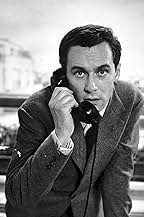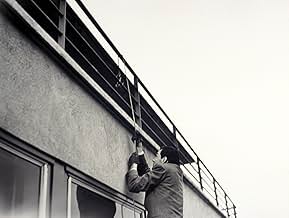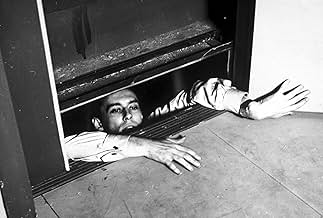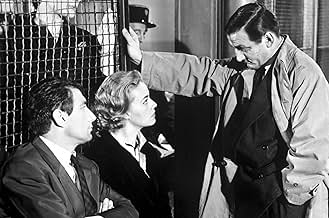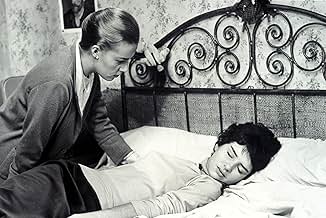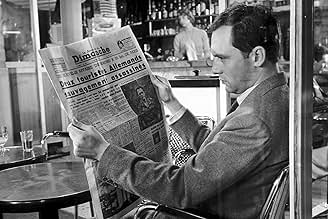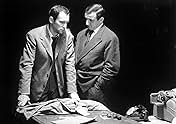VALUTAZIONE IMDb
7,9/10
30.639
LA TUA VALUTAZIONE
Un uomo d'affari sicuro di sé uccide il suo datore di lavoro, il marito della sua amante, provocando senza volerlo una sfortunata catena di eventi.Un uomo d'affari sicuro di sé uccide il suo datore di lavoro, il marito della sua amante, provocando senza volerlo una sfortunata catena di eventi.Un uomo d'affari sicuro di sé uccide il suo datore di lavoro, il marito della sua amante, provocando senza volerlo una sfortunata catena di eventi.
- Regia
- Sceneggiatura
- Star
- Premi
- 1 vittoria in totale
Recensioni in evidenza
Louis Malle was all of 25 when he made his directorial debut with this 1958 noirish thriller that also serves as a morality play. Using the elevator of the title as a vehicle for his leitmotif, he does an admirable job of capturing the smoky gray atmosphere of Paris in the 1950's and using it to great cinematic effect on a chain-link story of deception and murder. In fact, the whole movie plays like a Francophile version of a James M. Cain novel times two with plot twists coming in quick and sometimes contrived succession. To its credit, the brief 92-minute running time trots by quickly given the multiple story lines.
The labyrinth story focuses first on illicit lovers Florence Carala, the restless wife of a corrupt arms dealer, and Julien Tavernier, a former war hero working for Florence's husband. There is not a wasted moment as they plot her husband's murder, but of course, things go awry with a forgotten piece of evidence and a running car ready to be taken. An amoral young couple, sullen and resentful Louis and free-spirited Veronique, enter the scene tangentially and get caught up in their own deceptions with a boisterous German couple whom they meet through a fender bender. The plot strands meander somewhat and eventually come together in a climax that has all the characters confronting the harsh reality of their past actions. There is a particular poignancy in the photos Florence sees at the end since we have no indication of the depth of emotion between the lovers otherwise.
Malle, along with co-screenwriter Roger Nimier, presents an interesting puzzle full of irony and chance events, but there is a periodic slackness to the suspense, for instance, Florence's endlessly despondent walk though nocturnal Paris. Jazz great Miles Davis contributes a fitting hipster score, though the music is not as big an element as I expected in setting the mood. With her sorrowful eyes and pouting intelligence, Jeanne Moreau makes a vivid impression as Florence and gives her obsessed character the necessary gravitas to make her journey worthy of our interest. Maurice Ronet effectively plays Julien like a coiled spring throughout, and it's intriguing to note how most of his performance takes place in an immobilized elevator. As Louis and Veronique, Georges Poujuloy and the especially pixyish Yori Bertin are the forerunners for the runaway pair in Jean-Luc Godard's "Breathless" replete with youthful angst and mercenary cool.
The print transfer on the 2006 Criterion Collection DVD package is wonderfully pristine. The first disc also contains the original and 2005 re-release trailers, though there is surprisingly no scholarly audio commentary track (the usual bonus for a Criterion release). The second disc, however, makes up for it with a bevy of extras starting with an extensive 1975 early career retrospective interview with Malle, a 2005 interview with an aged but still haunting Moreau, and a joint interview with the two icons and one-time lovers at the 1993 Cannes Film Festival.
Three shorts on the second disc focus on Davis's contribution - the six-minute "The Record Session" shot the night Davis and his musicians recorded the score; a remembrance piece with pianist Rene Utreger, the only surviving member of Davis's ensemble; and the celebratory "Miles Goes Modal: The Breakthrough Score to Elevator to the Gallows" where jazz trumpeter Jon Faddis and music critic Gary Giddins discuss Davis's influence over the generation of musicians to come. There is also a short by Malle set to Charlie Parker's "Crazeology" and an informative 25-page photo essay booklet.
The labyrinth story focuses first on illicit lovers Florence Carala, the restless wife of a corrupt arms dealer, and Julien Tavernier, a former war hero working for Florence's husband. There is not a wasted moment as they plot her husband's murder, but of course, things go awry with a forgotten piece of evidence and a running car ready to be taken. An amoral young couple, sullen and resentful Louis and free-spirited Veronique, enter the scene tangentially and get caught up in their own deceptions with a boisterous German couple whom they meet through a fender bender. The plot strands meander somewhat and eventually come together in a climax that has all the characters confronting the harsh reality of their past actions. There is a particular poignancy in the photos Florence sees at the end since we have no indication of the depth of emotion between the lovers otherwise.
Malle, along with co-screenwriter Roger Nimier, presents an interesting puzzle full of irony and chance events, but there is a periodic slackness to the suspense, for instance, Florence's endlessly despondent walk though nocturnal Paris. Jazz great Miles Davis contributes a fitting hipster score, though the music is not as big an element as I expected in setting the mood. With her sorrowful eyes and pouting intelligence, Jeanne Moreau makes a vivid impression as Florence and gives her obsessed character the necessary gravitas to make her journey worthy of our interest. Maurice Ronet effectively plays Julien like a coiled spring throughout, and it's intriguing to note how most of his performance takes place in an immobilized elevator. As Louis and Veronique, Georges Poujuloy and the especially pixyish Yori Bertin are the forerunners for the runaway pair in Jean-Luc Godard's "Breathless" replete with youthful angst and mercenary cool.
The print transfer on the 2006 Criterion Collection DVD package is wonderfully pristine. The first disc also contains the original and 2005 re-release trailers, though there is surprisingly no scholarly audio commentary track (the usual bonus for a Criterion release). The second disc, however, makes up for it with a bevy of extras starting with an extensive 1975 early career retrospective interview with Malle, a 2005 interview with an aged but still haunting Moreau, and a joint interview with the two icons and one-time lovers at the 1993 Cannes Film Festival.
Three shorts on the second disc focus on Davis's contribution - the six-minute "The Record Session" shot the night Davis and his musicians recorded the score; a remembrance piece with pianist Rene Utreger, the only surviving member of Davis's ensemble; and the celebratory "Miles Goes Modal: The Breakthrough Score to Elevator to the Gallows" where jazz trumpeter Jon Faddis and music critic Gary Giddins discuss Davis's influence over the generation of musicians to come. There is also a short by Malle set to Charlie Parker's "Crazeology" and an informative 25-page photo essay booklet.
ELEVATOR TO THE GALLOWS starts out as a quirky sort of crime film. Florence (the amazing Jeanne Moreau) has convinced her lover, Julien (Maurice Ronet), to kill her husband. All goes well, until Julien realizes he's made a glaring mistake, leading to his getting stuck in the titular lift.
What began as a fairly ordinary murder, soon devolves into a cascade of ironic madness. The genius of this film lies in its subtle, increasingly dark, interconnected situations. Characters are introduced who get involved, making things far worse for everyone. As we watch it unfold, we try to figure out how it will end, only to be stuck and rolled up in the sticky web that Director Louis Malle has spun.
Mr. Ronet plays Julien with a cool dissociation. Ms. Moreau's Florence strolls through the entire movie like a morose, drifting spirit. Her inner monologue makes up the bulk of her lines.
The French filmmakers of the late 1950s were ahead of their time, and this movie is a great example of this...
What began as a fairly ordinary murder, soon devolves into a cascade of ironic madness. The genius of this film lies in its subtle, increasingly dark, interconnected situations. Characters are introduced who get involved, making things far worse for everyone. As we watch it unfold, we try to figure out how it will end, only to be stuck and rolled up in the sticky web that Director Louis Malle has spun.
Mr. Ronet plays Julien with a cool dissociation. Ms. Moreau's Florence strolls through the entire movie like a morose, drifting spirit. Her inner monologue makes up the bulk of her lines.
The French filmmakers of the late 1950s were ahead of their time, and this movie is a great example of this...
Greetings again from the darkness. The phrase Film Noir conjures up a certain feel and look and "Gallows" certainly captures what we have come to expect from the genre. However, the great director Louis Malle goes even further with his minimalistic approach to sound, lighting and dialog. Where 1944's "Double Indemnity" wreaks explosive on screen passion, Malle offers up a quiet simmering that draws the viewer into the lives of the main characters.
Jeanne Moreau is the perfect pouty French femme fatale. Her scenes of walking (wandering) the dark, rainy streets of Paris are chilling to watch for film lovers. The weak lighting and lack of make-up allow Moreau's true emotions to guide us. Malle also is tremendous in his filming of the elevator scenes with Maurice Ronet.
The secondary characters of the young lovers played by Yori Bertin (Veronique) and George Poujouly (Louis) are unmistakable in their likeness to Natalie Wood and James Dean. Watching two young kids carelessly destroy their own lives, as well as that of others, is quite the contrast to the well-conceived scheme of Moreau and Ronet.
I have not been able to come up with an apt description of the powerfully improvised jazz score from the legendary Miles Davis. The approach has been mimicked over the years, but never duplicated. It is startling in its ability to slap the viewer in the face! Moreau is of course a screen legend and went on to star in "Jules and Jim", Truffaut's "The Four Hundred Blows" and my personal favorite, "The Bride Wore Black". As great as she was in all of these, I am not sure her essence was ever better captured than her wandering through the Paris streets in "Elevator to the Gallows".
Jeanne Moreau is the perfect pouty French femme fatale. Her scenes of walking (wandering) the dark, rainy streets of Paris are chilling to watch for film lovers. The weak lighting and lack of make-up allow Moreau's true emotions to guide us. Malle also is tremendous in his filming of the elevator scenes with Maurice Ronet.
The secondary characters of the young lovers played by Yori Bertin (Veronique) and George Poujouly (Louis) are unmistakable in their likeness to Natalie Wood and James Dean. Watching two young kids carelessly destroy their own lives, as well as that of others, is quite the contrast to the well-conceived scheme of Moreau and Ronet.
I have not been able to come up with an apt description of the powerfully improvised jazz score from the legendary Miles Davis. The approach has been mimicked over the years, but never duplicated. It is startling in its ability to slap the viewer in the face! Moreau is of course a screen legend and went on to star in "Jules and Jim", Truffaut's "The Four Hundred Blows" and my personal favorite, "The Bride Wore Black". As great as she was in all of these, I am not sure her essence was ever better captured than her wandering through the Paris streets in "Elevator to the Gallows".
10jbinfo
This film is a master piece. Miles Davis's music is superb. It is an object lesson on the art of combining sound and vision. The tension and the brooding Parisian atmosphere are heightened with cool and poignant playing. It is surprising (to the best of my knowledge) that this is the only complete original film score he produced.
The story of the crime is clever. It has reasonable human motivation and plot, and is steadily revealed. But, it is the study of 'being in the wrong place at the wrong time' that makes this film a classic. The series of chance events that will dramatically effect the characters' lives, give this film a similar feel to 'Run Lola Run' or 'Irreversible', dispute this film's linear structure and age. The dark cinematography is excellent.
I have only had an opportunity to see it once (I only just caught it because BBC4 listed it under its English title), but I would like to see it again.
The soundtrack is widely available, but I can not find the film on DVD or PAL VHS. This film should be available to a wider audience, for me, preferably in French with English subtitles.
P.S. This wonderful film is now available on DVD as part of the Louis Malle Collection: Volume 1. (Updated 11/10/2006.)
The story of the crime is clever. It has reasonable human motivation and plot, and is steadily revealed. But, it is the study of 'being in the wrong place at the wrong time' that makes this film a classic. The series of chance events that will dramatically effect the characters' lives, give this film a similar feel to 'Run Lola Run' or 'Irreversible', dispute this film's linear structure and age. The dark cinematography is excellent.
I have only had an opportunity to see it once (I only just caught it because BBC4 listed it under its English title), but I would like to see it again.
The soundtrack is widely available, but I can not find the film on DVD or PAL VHS. This film should be available to a wider audience, for me, preferably in French with English subtitles.
P.S. This wonderful film is now available on DVD as part of the Louis Malle Collection: Volume 1. (Updated 11/10/2006.)
10noralee
"Elevator to the Gallows (Ascenseur pour l'échafaud)" is a master work, so it's startling to learn that it was Louis Malle's first feature. It's a mother lode textbook of how-to for noir genre filmmakers as he creates his own style from what he's learned from other masters.
Malle pays tribute to the tense murder style of Hitchcock with Billy Wilder's cynicism of selfishness a la "Double Indemnity" plus Graham Greene-like, post-war politics from "The Third Man"-- and arms and oil dealers with military pasts in the Middle East are not outdated let alone adulterous lovers and rebellious teenagers.
The film drips with sex and violence without actually showing either -- sensuous Jeanne Moreau walking through a long, rainy Paris night is enough to incite both.
The black and white cinematography by Henri Decaë is breathtakingly beautiful in this newly struck 35 mm print, from smokey cafés with ever watchful eyes like ours to the titular, ironic alibi's long shafts (which surely must have inspired a key, far paler scene in "Speed") to highway lights, to a spare interrogation box, but particularly in the street scenes. The coincidences and clues are built up, step by step, visually, including the final damning evidence.
Miles Davis's improvisations gloriously and agitatedly burst forth as if pouring from the cafés and radios, but the bulk of the film is startlingly silent, except for ambient sounds like rain that adds to the tension in the plot.
The characters are archetypes -- the steely ex-Legonnaire, the James Dean and Natalie Wood imitators, the preening prosecutor -- that fit together in a marvelous puzzle. But all are cool besides Moreau's fire, as she dominates the look of the film, just wandering around Paris.
There is some dialog that doesn't quite make sense at the end, but, heck, neither does "The Big Sleep" and this is at least in that league, if not higher in the pantheon.
Malle pays tribute to the tense murder style of Hitchcock with Billy Wilder's cynicism of selfishness a la "Double Indemnity" plus Graham Greene-like, post-war politics from "The Third Man"-- and arms and oil dealers with military pasts in the Middle East are not outdated let alone adulterous lovers and rebellious teenagers.
The film drips with sex and violence without actually showing either -- sensuous Jeanne Moreau walking through a long, rainy Paris night is enough to incite both.
The black and white cinematography by Henri Decaë is breathtakingly beautiful in this newly struck 35 mm print, from smokey cafés with ever watchful eyes like ours to the titular, ironic alibi's long shafts (which surely must have inspired a key, far paler scene in "Speed") to highway lights, to a spare interrogation box, but particularly in the street scenes. The coincidences and clues are built up, step by step, visually, including the final damning evidence.
Miles Davis's improvisations gloriously and agitatedly burst forth as if pouring from the cafés and radios, but the bulk of the film is startlingly silent, except for ambient sounds like rain that adds to the tension in the plot.
The characters are archetypes -- the steely ex-Legonnaire, the James Dean and Natalie Wood imitators, the preening prosecutor -- that fit together in a marvelous puzzle. But all are cool besides Moreau's fire, as she dominates the look of the film, just wandering around Paris.
There is some dialog that doesn't quite make sense at the end, but, heck, neither does "The Big Sleep" and this is at least in that league, if not higher in the pantheon.
Lo sapevi?
- QuizMiles Davis recorded the music in a single recording session while he watched a screening. He composed it while watching a rough cut and then invited a quartet of French and US musicians in a for few hours (from 11pm to 5am one night), improvising each number and allegedly sipping champagne with Jeanne Moreau and Louis Malle.
- BlooperWhen Florence arrives at the motel, the photos are just being developed - with the lights on! Exposing the prints to light before fixation would make them turn black. By the way, it's not recommended to put your hands into developer.
- Citazioni
Julien Tavernier: Don't sneer at war. It's your bread and butter. Indochina netted you how much? And now Algeria. Have some respect for war. It's your family heirloom.
- Colonne sonoreAscenseur Pour L'Échafaud (Générique)
Composed by Miles Davis
Performed by Miles Davis (Trumpet), Barney Wilen (Tenor Saxophone), Emilhenco (as René Urtreger) (Piano), Pierre Michelot (Bass) and Kenny Clarke (Drums)
I più visti
Accedi per valutare e creare un elenco di titoli salvati per ottenere consigli personalizzati
- How long is Elevator to the Gallows?Powered by Alexa
Dettagli
- Data di uscita
- Paese di origine
- Siti ufficiali
- Lingue
- Celebre anche come
- Elevator to the Gallows
- Luoghi delle riprese
- 26 Rue de Courcelles, Paris 8, Parigi, Francia(Tavernier climbing on the upper terrace)
- Azienda produttrice
- Vedi altri crediti dell’azienda su IMDbPro
Botteghino
- Lordo Stati Uniti e Canada
- 374.671 USD
- Fine settimana di apertura Stati Uniti e Canada
- 7354 USD
- 26 giu 2005
- Lordo in tutto il mondo
- 431.784 USD
- Tempo di esecuzione
- 1h 31min(91 min)
- Colore
- Proporzioni
- 1.66 : 1
Contribuisci a questa pagina
Suggerisci una modifica o aggiungi i contenuti mancanti


